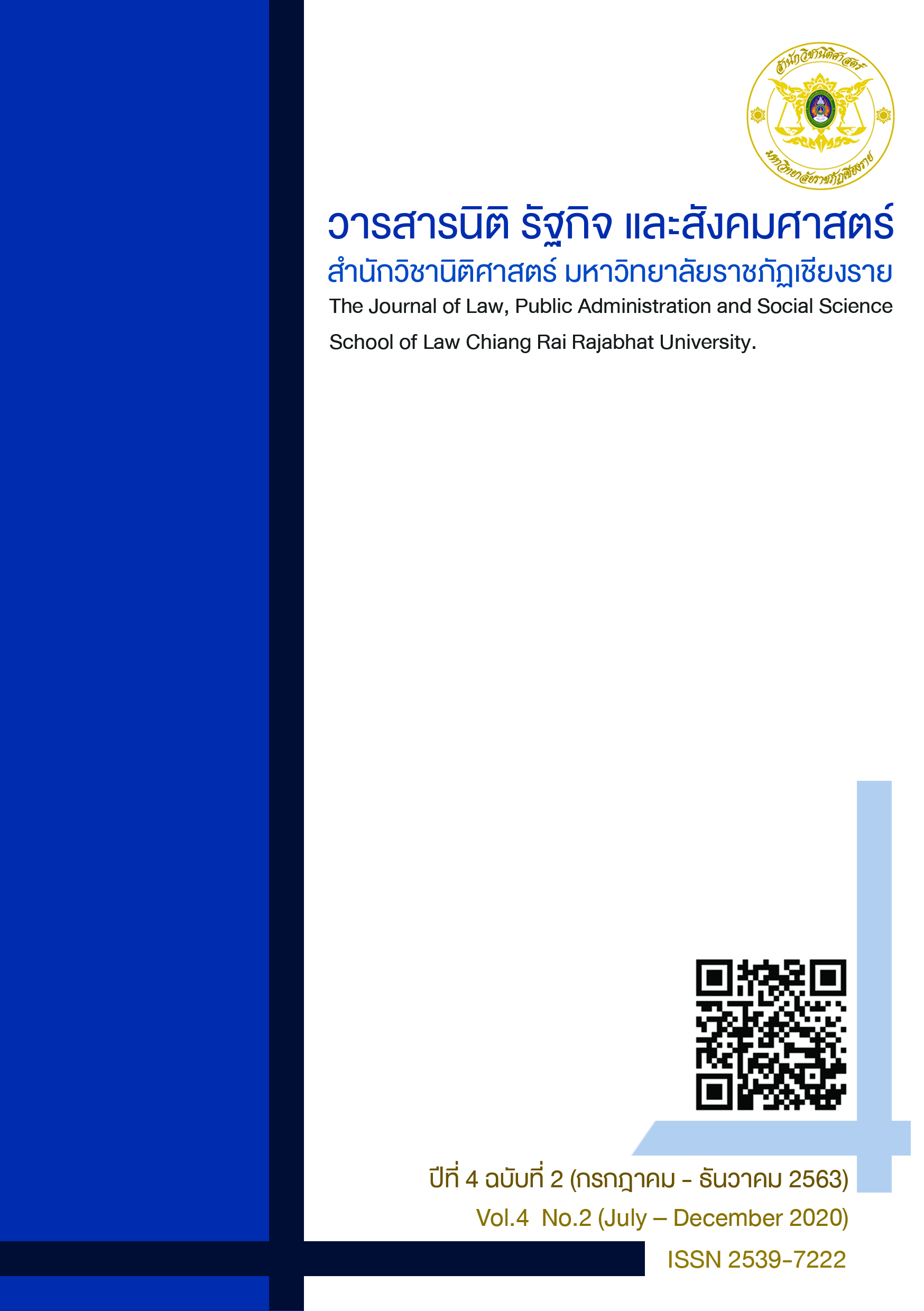สิทธิมนุษยชน : ศึกษาเปรียบเทียบในทางพระพุทธศาสนา
Main Article Content
บทคัดย่อ
การวิจัยครั้งนี้ มีวัตถุประสงค์เพื่อศึกษาหลักการและแนวคิดเกี่ยวกับสิทธิมนุษยชนในสังคมตะวันตก เพื่อค้นหาองค์ความรู้เกี่ยวกับสิทธิมนุษยชนในพระพุทธศาสนาและเพื่อเปรียบเทียบสิทธิมนุษยชนตะวันตกกับของพระพุทธศาสนา ใช้ระเบียบวิธีวิจัยเชิงคุณภาพ เก็บรวบรวมข้อมูลจากเอกสาร และการสัมภาษณ์เชิงลึก วิเคราะห์ข้อมูลจากเอกสารโดยการวิเคราะห์เนื้อหา ข้อมูลจากการสัมภาษณ์โดยใช้วิธีถอดความและสรุปประเด็น ผลการวิจัยพบว่า
สิทธิมนุษยชนมีที่มาจากหลักการและแนวคิดทางปรัชญาและศาสนา ตลอดจนการต่อสู้ทางการเมืองมาอย่างยาวนานของคนตะวันตก จนได้มาเป็นหลักประกันซึ่งสิทธิ เสรีภาพ ความเสมอภาคและการยอมรับในศักดิ์ศรีความเป็นมนุษย์ มีแสดงไว้ในปฏิญญาสากลว่าด้วยสิทธิมนุษยชน ส่วนองค์ความรู้และแนวคิดเกี่ยวกับสิทธิมนุษยชนในพระพุทธศาสนาและการเปรียบเทียบกับหลักการในทางพระพุทธศาสนานั้น ไม่พบคำศัพท์ว่า สิทธิมนุษยชนโดยตรงแต่อย่างใด พระพุทธศาสนาอธิบายสิทธิมนุษยชน ในความหมาย คือ 1.สิทธิในการเข้าถึงมรรคผลของคุณค่าความเป็นมนุษย์ 2.การที่มนุษย์มีชีวิตอยู่ด้วยกัน ด้วยความเคารพในชีวิตทุกชีวิต 3.การให้ความเคารพนับถือผู้อื่นหรือการไม่แบ่งชั้นวรรณะและการเป็นรากแก้วของชีวิต เทียบได้กับคำว่าศีล ส่วนคำว่า ศักดิ์ศรีความเป็นมนุษย์ คือ คุณค่าการทำให้มนุษย์ลดความโลภโกรธหลงหรือกิเลสลง เพราะสิ่งเหล่านี้ทำลายศักดิศรีความเป็นมนุษย์ ส่วนกรณีศึกษาสิทธิมนุษยชนเปรียบเทียบในพระไตรปิฎก ได้แก่ มหาเวสสันดรชาดกในกรณีการบริจาคบุตรและภรรยา ประเด็นการห้ามบุคคลบางประเภทบวชนั้นมีเหตุผลว่า การควบคุมปฏิบัติให้เป็นไปตามธรรมวินัยทำได้ยากและการบรรลุธรรมของบุคคลไม่จำเป็นต้องบวชก็ได้ นอกจากนี้พระพุทธศาสนามิได้ห้ามสตรีบวชเป็นภิกษุณี แต่ได้กำหนดเงื่อนไขในการเข้ามาบวชของสตรีตั้งแต่ครั้งพุทธกาล ปัญหาเรื่องความเลื่อมล้ำ ความไม่เท่าเทียมกันของบุคคล ในพระพุทธศาสนาเห็นว่า เป็นเรื่องธรรมชาติ จึงไม่สอดคล้องกับหลักสิทธิมนุษยชนแบบตะวันตก และในเรื่องเสรีภาพในพระพุทธศาสนากับในสิทธิมนุษยชนมีความแตกต่างกัน โดยเสรีภาพทางพระพุทธศาสนาเป็นเสรีภาพที่มีดุลยภาพ ขณะที่ทางโลกเป็นเสรีภาพเพื่อการทำได้ตามใจชอบมากกว่า
ผลการศึกษาที่ได้รับ จึงควรนำองค์ความรู้ในพระพุทธศาสนาที่เกี่ยวกับสิทธิมนุษยชน เผยแพร่สู่สังคมไทยให้มากขึ้น สร้างความร่วมมือกับวัดในพระพุทธศาสนา เช่น จัดเป็นศูนย์ส่งเสริมการเรียนรู้ด้านสิทธิมนุษยชนกับองค์ความรู้ในพระพุทธศาสนา หรือสร้างเครือข่ายสิทธิมนุษยชนตามแนวทางพระพุทธศาสนา ตลอดจนพัฒนาสื่อออนไลน์เกี่ยวกับธรรมและสิทธิมนุษยชน
Article Details
เอกสารอ้างอิง
จำนงค์ ทองประเสริฐ. (2540). ปรัชญาประยุกต์ชุดอินเดีย. (พิมพ์ครั้งที่ 2). กรุงเทพฯ: บริษัทเอช เอ็นกรุ๊ฟ จำกัด.
ดิเรก ควรสมาคม. (2560).กฎหมายมหาชนแนวประยุกต์. (พิมพ์ครั้งที่ 4). กรุงเทพฯ: สำนักพิมพ์วิญญูชน.
นพนิธิ สุริยะ. (2559). สิทธิมนุษยชน: แนวคิดและการคุ้มครอง. กรุงเทพฯ: สำนักพิมพ์วิญญูชน.
พระธรรมโกศาจารย์ (ประยูร ธมฺมจิตฺโต). (2552). ปรัชญากรีกบ่อเกิดภูมิปัญญาตะวันตก. (พิมพ์ครั้งที่7). กรุงเทพฯ: สำนักพิมพ์ศยาม.
พระธรรมปิฏก (ป.อ.ปยุตฺโต). (2528). เล่าเรื่องให้โยมฟังชุดที่ 2 ตอนที่ 22. (เทปบันทึกเสียง). วัดญาณเวศกวัน.
พระธรรมปิฏก (ปอ.ปยุตฺโต). (2554). ทัศนะของพระพุทธศาสนาต่อสตรีและการบวชเป็นภิกษุณี. (พิมพ์ครั้งที่ 4). สำนักพิมพ์สุขภาพใจ.
พระพรหมคุณาภรณ์ (ป.อ.ปยุตฺโต). ( 2547). สิทธิสตรีนิด สังคยนาหน่อย. ธรรมบรรยายชุดธรรมมองโลก. วัดญาณเวศกวัน.
วิทยากร เชียงกูล. (2555). ปรัชญา การเมือง เศรษฐกิจสังคม. (พิมพ์ครั้งที่ 5). กรุงเทพฯ: สำนักพิมพ์วิญญูชน.
สิทธิ์ บุตรอินทร์. (2554). ปรัชญาเปรียบเทียบมนุษยนิยมตะวันออกกับตะวันตก. กรุงเทพฯ: บริษัทสร้างสรรค์บุ๊ค.
เสน่ห์ จามริก. (2545). พุทธศาสนากับสิทธิมนุษยชน. สำนักงานคณะกรรมการสิทธิมนุษยชนแห่งชาติ.
สมยศ เชื้อไทย. (2554). นิติปรัชญาเบื้องต้น. (พิมพ์ครั้งที่ 14). กรุงเทพฯ: สำนักพิมพ์วิญญูชน.
Hass, M. (2008). International human rights. New York: Routledge.


